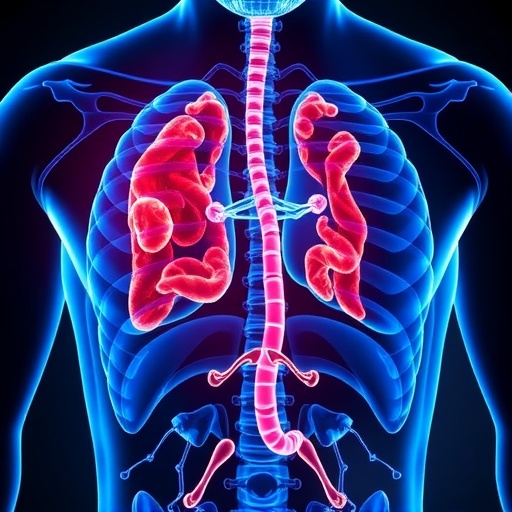In the ever-evolving landscape of cancer therapeutics, the integration of nanotechnology with phytochemicals stands at the forefront of innovative research, promising to revolutionize the management of prostate cancer. Prostate cancer remains one of the most pervasive malignancies affecting men globally, often presenting significant challenges in treatment due to tumor heterogeneity and therapy resistance. A recent comprehensive narrative review meticulously explores the burgeoning field of nano-phytochemical-based formulations, shedding light on their potential to transform prostate cancer therapy with enhanced efficacy and reduced systemic toxicity.
Phytochemicals, naturally occurring compounds derived from plants, have long been recognized for their anticancer properties. However, their clinical application has been hindered by issues related to bioavailability, stability, and targeted delivery. Nanotechnology, through the engineering of nanoparticles at the molecular level, addresses these limitations by enabling precise drug delivery systems that enhance the concentration of phytochemicals at tumor sites while minimizing off-target effects. This synergy between natural compounds and advanced delivery platforms could mark a paradigm shift in oncological treatments.
The review delves into multiple classes of phytochemicals, including flavonoids, alkaloids, and polyphenols, each exhibiting unique mechanisms against prostate cancer cells. These include the modulation of signaling pathways critical to cancer cell proliferation, apoptosis induction, and inhibition of angiogenesis. When encapsulated in nanoscale carriers such as liposomes, solid lipid nanoparticles, and polymeric nanoparticles, these phytochemicals demonstrate improved pharmacokinetics and pharmacodynamics, pointing toward more effective clinical outcomes.
An important aspect highlighted is the versatility of nano-carriers, which can be engineered for active targeting through surface modifications with ligands that bind specifically to prostate cancer cell receptors. This targeted approach enhances therapeutic precision and reduces adverse effects commonly associated with chemotherapy. Moreover, the review discusses the innovative use of stimuli-responsive nanoparticles that release their phytochemical payload in response to specific tumor microenvironmental triggers like pH changes or enzymatic activity, further refining treatment specificity.
Critical to this discourse is the preclinical and clinical evaluation of these nano-phytochemical formulations. The authors collate evidence from various in vitro studies and animal models demonstrating significant tumor growth inhibition and enhanced apoptosis with minimal toxicity profiles. Some formulations have progressed to early-phase clinical trials, showcasing their potential translational appeal. Nonetheless, the review cautions about the challenges in standardizing nanoformulation protocols and ensuring reproducibility, which are paramount for regulatory approval.
Phytochemical nanoformulations also offer a promising avenue in overcoming multidrug resistance (MDR) — a major hurdle in the treatment of advanced prostate cancer. By facilitating higher intracellular drug accumulation and evading efflux mechanisms, these nanocarriers potentiate the anticancer efficacy of phytochemicals. Additionally, their combinational use with conventional chemotherapeutics may provide synergistic effects, enabling dose reductions and mitigating dose-limiting toxicities.
The review doesn’t shy away from addressing safety concerns and the biocompatibility of nanomaterials. Biodegradable and biocompatible polymers are preferred choices for fabricating nano-phytochemical systems to avoid undesirable immune responses or long-term toxicity. Moreover, the pharmacokinetic fate and clearance mechanisms of these nanoparticles are scrutinized to ensure favorable profiles conducive for clinical adoption.
One of the critical insights from the review is the necessity for multidisciplinary collaboration. The complexity of designing, testing, and translating nano-phytochemical therapies requires integration of expertise from oncology, pharmacology, nanotechnology, and materials science. Such collaborative frameworks can accelerate innovation, optimize formulations, and tailor therapies to individual patient profiles for precision medicine applications.
The narrative further explores the potential economic and regulatory implications surrounding nano-phytochemical drugs. While formulation costs are higher due to sophisticated manufacturing processes, the long-term benefits of targeted, less toxic therapies could offset initial expenditures through improved patient outcomes and reduced hospitalization rates. Regulatory landscapes are evolving, and the review underscores the importance of robust preclinical data and standardized characterization methodologies to meet evolving guidelines.
Future directions highlighted include the exploration of novel plant-derived compounds with anticancer potential and the advancement of multifunctional nanoparticles capable of simultaneous imaging and therapy (theranostics). Such platforms could enable real-time monitoring of therapeutic responses and timely adjustments, enhancing treatment efficacy and patient quality of life.
Patient compliance and quality of life are also key considerations. Nanocarriers can enable oral administration of phytochemicals traditionally limited to intravenous routes, offering more convenient and less invasive treatment options. Additionally, sustained release profiles enabled by advanced nanoformulations may reduce dosing frequency, further enhancing adherence.
The review eloquently stitches together a vision where natural product-based nanomedicines emerge as cornerstone agents in managing prostate cancer. This vision aligns with the broader paradigm shift toward personalized, targeted, and less toxic cancer treatments propelled by nanomedicine advancements.
In conclusion, nano-phytochemical-based formulations represent a compelling fusion of nature and technology, poised to overcome longstanding therapeutic barriers in prostate cancer treatment. The integration of plant-derived anticancer compounds with innovative nanotechnologies paves the way for therapies that are not only more effective but also safer and better tolerated. While challenges remain in the path to clinical translation, the foundation laid by this comprehensive review illustrates an exciting horizon for prostate cancer management and the broader oncology field.
Subject of Research: Nano-phytochemical-based formulations for prostate cancer therapy and management
Article Title: Nano-phytochemical-based formulations as promising opportunities for prostate cancer therapy and management: a comprehensive narrative review
Article References:
Bakhshan, M.A., Sheikhzadeh, S., Ramezanimoladehi, M. et al. Nano-phytochemical-based formulations as promising opportunities for prostate cancer therapy and management: a comprehensive narrative review. Med Oncol 42, 510 (2025). https://doi.org/10.1007/s12032-025-03059-8
Image Credits: AI Generated
Tags: advanced formulations for cancer treatmentalkaloids in prostate canceranticancer properties of flavonoidsenhancing bioavailability of phytochemicalsnano-phytochemical solutionsnanotechnology in cancer treatmentovercoming therapy resistance in prostate cancerphytochemicals for cancer managementpolyphenols and cancer cell inhibitionprostate cancer therapy innovationstargeted drug delivery systemstumor heterogeneity challenges in oncology





